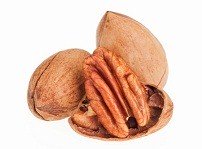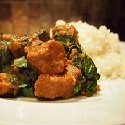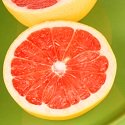Lose Weight
![]() Calories in Food
Calories in Food
![]() Calories in Nuts
Calories in Nuts
![]() Calories in Pecans
Calories in Pecans
Calories in Pecans, Pecan
Nutrition Facts
How many calories in Pecans? See below, the Pecan Nuts calories for the different serving sizes. We provide you with Pecans nutrition facts and the health benefits of Pecans to help you lose weight and eat a healthy diet.
Pecan Nuts have a lovely buttery taste to them, famously used in Pecan Pie. They are high in both Mono and Poly Unsaturated fats, about three fifths of the nut. They are also high in fiber, protein, vitamins B1 (thiamine), B5 (pantothenic acid), B6, iron, magnesium, manganese, phosphorus and zinc and a lot more. Diets rich in nuts can lessen the risk of gallstones, but all nuts contain saturated fat. Pecans contain about 6%, so restrict your intake to about two portions a week if on a weight loss program. The phytosterols and antioxidants in the Pecan help to lower our bad cholesterol (LDL). Other Pecan benefits are thought to delay the degeneration of our muscles.

It is considered that if you eat a portion of nuts about twice a week, it was reported in a journal called "Obesity", that you are less likely to gain weight than those who do not eat nuts.
Compare calories in Pecans with the other calories in nuts.
Calories in Pecans, Raw
Refuse: 47% (Shells)Scientific Name: Carya illinoinensis
| Serving Size | Calories per Serving |
| 100 grams | 691 kcal (2889 kJ) |
| 1 cup, chopped, 109 grams | 753 kcal (3149 kJ) |
| 1 cup, halves, 99 grams | 684 kcal (2860 kJ) |
| 1 oz (19 halves), 28.35 grams | 196 kcal (819 kJ) |
Nuts, Pecans, Dry Roasted
Refuse: 0%| Serving Size | Calories per Serving |
| 100 grams | 710 kcal (2969 kJ) |
| 1 oz, 28.35 grams | 201 kcal (842 kJ) |
Pecan Nut Nutrition Facts
| Nutritional value per 100 g (3.5 oz) | |
|---|---|
| Proximates: | |
| Water | 1.21 g |
| Energy | 2969 kJ (710 kcal) |
| Protein | 9.50 g |
| Carbohydrates | 13.55 g |
| Sugars | 4.06 g |
| Total Fat: | 74.27 g |
| saturated fat | 6.283 g |
| monounsaturated fat | 43.957 g |
| polyunsaturated fat | 20.572 g |
| Cholesterol | 0 mg |
| Fiber | 9.4 g |
| Minerals: | |
| Calcium, Ca | 72 mg (7 %) |
| Iron, Fe | 2.65 mg (16 %) |
| Magnesium, Mg | 118 mg (30 %) |
| Phosphorus, P | 293 mg (29 %) |
| Potassium, K | 424 mg (9 %) |
| Zinc, Zn | 5.07 mg (34 %) |
| Copper, Cu | 1.167 mg (0 %) |
| Manganese, Mn | 3.933 mg (197 %) |
| Selenium, Se | 4.0 mcg (6 %) |
| Vitamins: | |
| Vitamin C | 0.7 mg (1.2 %) |
| Thiamine (Vit. B1) | 0.450 mg (47 %) |
| Riboflavin (Vit. B2) | 0.087 mg (5 %) |
| Niacin (Vit. B3) | 2.274 mg (11.4 %) |
| Pantothenic acid (B5) | 0.603 mg (6 %) |
| Vitamin B6 | 0.359 mg (18 %) |
| Folate (Vit. B9) | 10 mcg (2.5 %) |
| Vitamin B12 | 0.0 mcg (0 %) |
| Vitamin A | 0 IU (0 %) |
| Vitamin E | 0.57 mg (3 %) |
| Vitamin D | 0 IU (0 %) |
| Vitamin K | 0 mcg (0 %) |
| Percentages are relative to US Recommended Daily Intake (RDI) for adults. | |
Author: Lana Soko
You Might Also Like:
Like This Page?
|
Share This Page:
|
Search Our Site:

Free E-Book:
We Recommend:
Looking to get your body into great shape? Get the very best results for your efforts and money! Save your valuable time from surfing the internet. These are theBestselling Weight Loss Programs

Programs that work and have thousands of satisfied customers worldwide!

 |




